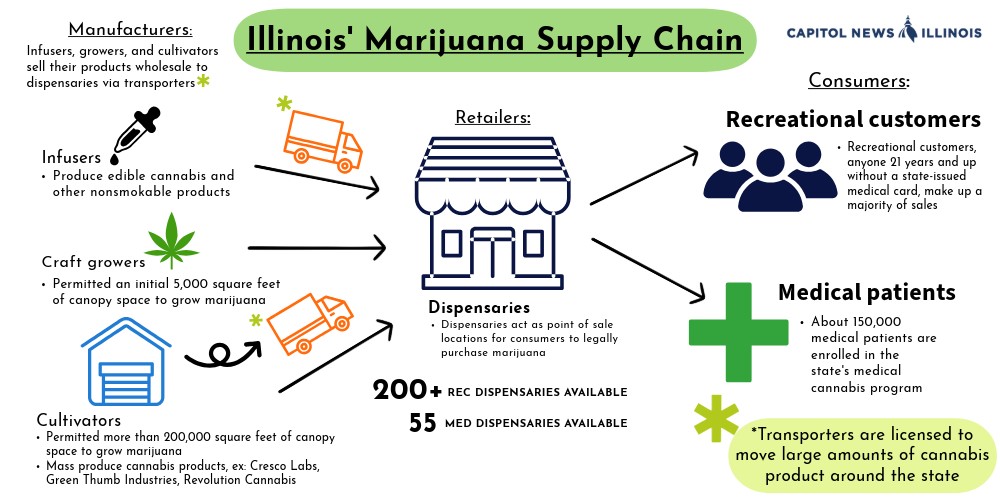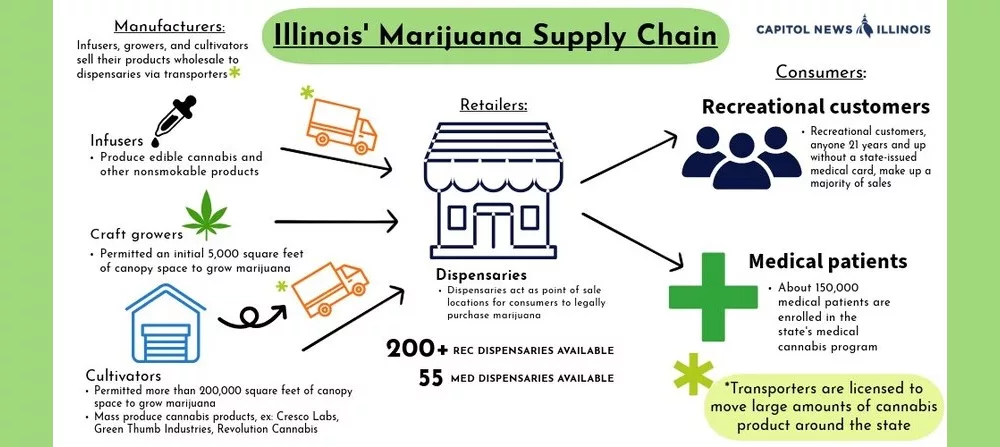
By DILPREET RAJU
Capitol News Illinois
draju@capitolnewsillinois.com
Medical marijuana patients can now purchase cannabis grown by small businesses as part of their allotment, Illinois’ top cannabis regulator said, but smaller, newly licensed cannabis growers are still seeking greater access to the state’s medical marijuana customers.
Illinois legalized medicinal marijuana beginning in 2014, then legalized it for recreational use in 2020. While the 2020 law legalized cannabis use for any adult age 21 or older, it did not expand licensing for medical dispensaries.
Patients can purchase marijuana as part of the medical cannabis program at dual-purpose dispensaries, which are licensed to serve both medical and recreational customers. But dual-purpose dispensaries are greatly outnumbered by dispensaries only licensed to sell recreationally, and there are no medical-only dispensaries in the state.
As another part of the adult-use legalization law, lawmakers created a “craft grow” license category that was designed to give more opportunities to Illinoisans hoping to legally grow and sell marijuana. The smaller-scale grow operations were part of the 2020 law’s efforts to diversify the cannabis industry in Illinois.
Prior to that, all cultivation centers in Illinois were large-scale operations dominated by large multi-state operators. The existing cultivators, mostly in operation since 2014, were allowed to grow recreational cannabis beginning in 2019.
Until recently, dual-purpose dispensaries have been unsure as to whether craft-grown products, made by social equity licensees – those who have lived in a disproportionately impacted area or have been historically impacted by the war on drugs – can be sold medicinally as part of a patient’s medical allotment.
Erin Johnson, the state’s cannabis regulation oversight officer, told Capitol News Illinois last month that her office has “been telling dispensaries, as they have been asking us” they can now sell craft-grown products to medical patients.
“There was just a track and trace issue on our end, but never anything statutorily,” she said.
No notice has been posted, but Johnson’s verbal guidance comes almost two years after the first craft grow business went online in Illinois.
It allows roughly 150,000 medical patients, who dispensary owners say are the most consistent purchasers of marijuana, to buy products made by social equity businesses without paying recreational taxes. However – even as more dispensaries open – the number available to medical patients has not increased since 2018, something the Cannabis Regulation Oversight Office “desperately” wants to see changed. Johnson said Illinois is a limited license state, meaning “there are caps on everything” to help control the relatively new market.
Berwyn Thompkins, who operates two cannabis businesses, said the rules limited options for patients and small businesses.
“It’s about access,” Thompkins said. “Why wouldn’t we want all the patients – which the (adult-use) program was initially built around – why wouldn’t we want them to have access? They should have access to any dispensary.”
Customers with a medical marijuana card pay a 1 percent tax on all marijuana products, whereas recreational customers pay retail taxes between roughly 20 and 40 percent on a given cannabis product, when accounting for local taxes.
While Illinois has received praise for its equity-focused cannabis law, including through an independent study that showed more people of color own cannabis licenses than in any other state, some industry operators say they’ve experienced many unnecessary hurdles getting their businesses up and running.
The state, in fact, announced last month that it had opened its 100th social equity dispensary.
But Steve Olson, purchasing manager at a pair of dispensaries (including one dual-purpose dispensary) near Rockford, said small specialty license holders have been left in the lurch since the first craft grower opened in October 2022.
“You would think that this would be something they’re (the government) trying to help out these social equity companies with, but they’re putting handcuffs on them in so many different spots,” he said. “One of them being this medical thing.”
Olson said he contacted state agencies, including the Department of Financial and Professional Regulation, months ago about whether craft products can be sold to medical patients at their retail tax rate, but only heard one response: “They all say it was an oversight.”
This potentially hurt social equity companies because they sell wholesale to dispensaries and may have been missing out on a consistent customer base through those medical dispensaries.
Olson said the state’s attempts to provide licensees with a path to a successful business over the years, such as with corrective lotteries that granted more social equity licenses, have come up short.
“It’s like they almost set up the social equity thing to fail so the big guys could come in and swoop up all these licenses,” Olson said. “I hate to feel like that but, if you look at it, it’s pretty black and white.”
Olson said craft companies benefit from any type of retail sale.
“If we sell it to medical patients or not, it’s a matter of, ‘Are we collecting the proper taxes?’ That’s all it is,” he said.
State revenue from cannabis taxes, licensing costs and other fees goes into the Cannabis Regulation Fund, which is used to fund a host of programs, including cannabis offense expungement, the general revenue fund, and the R3 campaign aiming to uplift disinvested communities.
For fiscal year 2024, nearly $256 million was paid out from Cannabis Regulation Fund for related initiatives, which includes almost $89 million transferred to the state’s general revenue fund and more than $20 million distributed to local governments, according to the Illinois Department of Revenue.
Medical access still limited
The state’s 55 medical dispensaries that predate the 2020 legalization law, mostly owned by publicly traded multistate operators that had been operating in Illinois since 2014 under the state’s medical marijuana program, were automatically granted a right to licenses to sell recreationally in January 2020. That gave them a dual-purpose license that no new entrants into the market can receive under current law.
Since expanding their clientele in 2020, Illinois dispensaries have sold more than $6 billion worth of cannabis products through recreational transactions alone.
Nearly two-thirds of dispensaries licensed to sell to medical patients are in the northeast counties of Cook, DuPage, Kane, Lake and Will. Dual-purpose dispensaries only represent about 20 percent of the state’s dispensaries.
While the state began offering recreational dispensary licenses since the adult-use legalization law passed, it has not granted a new medical dispensary license since 2018. That has allowed the established players to continue to corner the market on the state’s nearly 150,000 medical marijuana patients.
But social equity licensees and advocates say there are more ways to level the playing field, including expanding access to medical sales.
Johnson, who became the state’s top cannabis regulator in late 2022, expressed hope for movement during the fall veto session on House Bill 2911, which would expand medical access to all Illinois dispensaries.
“We would like every single dispensary in Illinois to be able to serve medical patients,” Johnson said. “It’s something that medical patients have been asking for, for years.”
Johnson said the bill would benefit patients and small businesses.
“It’s something we desperately want to happen as a state system, because we want to make sure that medical patients are able to easily access what they need,” she said. “We also think it’s good for our social equity dispensaries, as they’re opening, to be able to serve medical patients.”
Rep. Bob Morgan, D-Deerfield, who was the first statewide project coordinator for Illinois’ medical cannabis program prior to joining the legislature, wrote in an email to Capitol News Illinois that the state needs to be doing more for its patients.
“Illinois is failing the state’s 150,000 medical cannabis patients with debilitating conditions. Too many are still denied the patient protections they deserve, including access to their medicine,” Morgan wrote, adding he would continue to work with stakeholders on further legislation.
Capitol News Illinois is a nonprofit, nonpartisan news service covering state government. It is distributed to hundreds of newspapers, radio and TV stations statewide. It is funded primarily by the Illinois Press Foundation and the Robert R. McCormick Foundation, along with major contributions from the Illinois Broadcasters Foundation and Southern Illinois Editorial Association.




